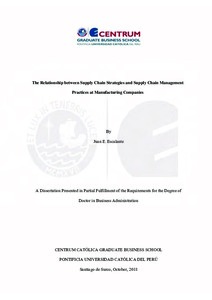| dc.contributor.advisor | Guevara Moncada, Rubén | |
| dc.contributor.author | Escalante Gómez, Juan Esteban | |
| dc.date.accessioned | 2018-10-11T22:25:06Z | |
| dc.date.available | 2018-10-11T22:25:06Z | |
| dc.date.created | 2018 | |
| dc.date.issued | 2018-10-11 | |
| dc.identifier.uri | http://hdl.handle.net/20.500.12404/12873 | |
| dc.description.abstract | The purpose of this research was to find the relationship that exists between supply chain strategies and supply chain management practices at manufacturing companies. A sample of 195 firms in Colombia was used. Data analysis was performed in three phases. Initially, an exploratory factor analysis was carried out to identify the dimensions underlying each construct and derive, from the literature, a parsimonious configuration of supply chain management strategies and practices. Then, using a confirmatory factor analysis, internal consistency and degree of fit of the measurement models was evaluated. Finally, a structural equation model was built to test the formulated hypotheses (CMIN/DF=1.865, RMSEA=0.067, CFI=0.884, IFI=0.888, PNFI=0.623). Results in terms of correspondence were dissimilar, as a positive and statistically significant link was found between the constructs lean supply chain strategy and relationship with supply chain partners (H1a, y11=0.750, p<0.01), lean supply chain strategy and information management (H1b, y21=0.705, p<0.01) and between agile supply chain strategy and relationship with supply chain partners (H2a, y12=0.420, p<0.01). However, links between lean supply chain strategy and postponement (H1c, y31=-0.182, p>0.01), agile supply chain strategy and information management (H2b, y22=0.201, p>0.01) and agile supply chain strategy and postponement (H2c, y32=0.227, p>0.01) were not supported by empirical evidence. This allowed concluding that planning and formulating a specific supply chain strategy must involve a joint deployment of the practices appropriate for materializing it and that not all supply chain management practices support fulfilling the goals defined for the chain. For future work, including an analysis of the effect of variables such as demand uncertainty, company size or type of industry in the evaluated relationship is suggested. The importance of longitudinal measurements or evaluations with a qualitative approach to understand the phenomenon being studied is also mentioned. | es_ES |
| dc.language.iso | eng | es_ES |
| dc.publisher | Pontificia Universidad Católica del Perú | es_ES |
| dc.rights | info:eu-repo/semantics/closedAccess | es_ES |
| dc.subject | Logística empresarial | es_ES |
| dc.subject | Investigación cuantitativa | es_ES |
| dc.title | The relationship between supply chain strategies and supply chain management practices at manufacturing companies | es_ES |
| dc.type | info:eu-repo/semantics/doctoralThesis | es_ES |
| thesis.degree.name | Doctor en Administración Estratégica de Empresas | es_ES |
| thesis.degree.level | Doctorado | es_ES |
| thesis.degree.grantor | Pontificia Universidad Católica del Perú. CENTRUM | es_ES |
| thesis.degree.discipline | Administración Estratégica de Empresas | es_ES |
| renati.advisor.dni | 48642063 | |
| renati.advisor.orcid | https://orcid.org/0000-0002-4795-2557 | es_ES |
| renati.author.cext | AR125552 | |
| renati.discipline | 413038 | es_ES |
| renati.level | https://purl.org/pe-repo/renati/level#doctor | es_ES |
| renati.type | http://purl.org/pe-repo/renati/type#tesis | es_ES |
| dc.publisher.country | PE | |
| dc.subject.ocde | https://purl.org/pe-repo/ocde/ford#5.02.04 | es_ES |





